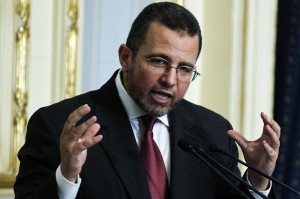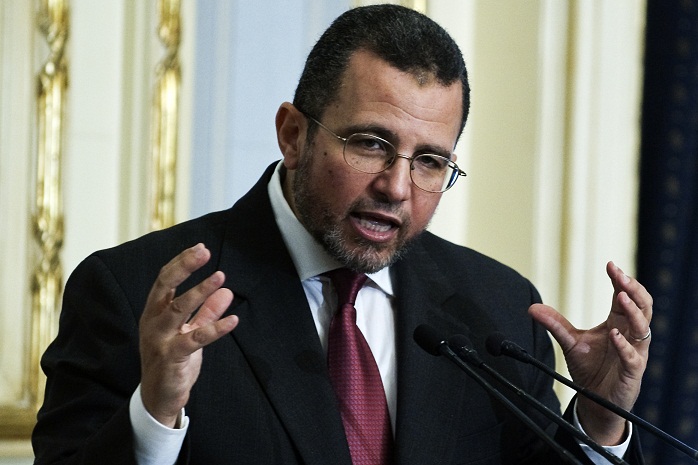
Prime Minister Hesham Qandil described the times we are passing through as “challenging” as he opened the Joint-African Development Bank (AfDB) and Social Fund for Development (SFD) youth employment forum in Cairo on Wednesday.
“Challenging, but also very exciting, because we are witnessing history,” Qandil said. “Every time we come to a milestone the challenge becomes very high, but we overcome this challenge and move forward,” he added.
The prime minister said the constitution was a major milestone “we will go to the people and see whether they want this constitution or not, then there will be parliamentary elections, provided that people say yes to the constitution.”
He went on to say that moving forward will not be without paying a cost, referring to the recent protests against the constitutional declaration and the proposed constitution.
Qandil reaffirmed the government’s commitment to fight unemployment through the formation of a ministerial committee under his auspices, which aims to create 750,000 jobs by supporting small businesses with the support of the Social Fund for Development.
The committee’s goal is to draft a competitive strategy for small projects. The intention is to focus on policies and legislation that creates jobs.
Qandil also talked about the cooperation between the government and the AfDB, which will allocate $1 billion as a deficit support to Egypt, paid in two tranches, the first half will be received shortly and the other is in the pipeline.
The conference brought together stakeholders from AfDB, SFD, the Egyptian government, NGOs and representatives from the private sector as well as development partners, to find innovative ways of promoting employment initiatives that target Egypt’s youth, who are struggling to find good jobs during challenging economic times.
“Unemployment, particularly amongst youth, was a key grievance voiced by protesters during the revolution. With more than 750,000 new entrants to the labour market every year, the unemployment rate in Egypt has been on the rise, going from 8.7 per cent in 2008 to what will likely be over 13 per cent by the end of 2012,” said Sibry Tapsoba, Resident Representative of AfDB in Egypt. Almost 90 per cent of all unemployed people are between 15 and 29, Tapsoba explained. He also added that unemployment is increasingly concentrated among the educated young. For men, university graduates comprise the largest segment of unemployed, while high-school graduates report the highest rates of unemployment for women.
The managing director of the social fund for development, Ghada Fathi Waly, said there was a real need for urgent action to give young people a chance to prove their worth in the workplace. “Our priority is crystal clear: decent jobs and decent incomes,” said Waly. “SFD was created to support growth and development of small and micro enterprises and to avail employment. In doing this, we collaborate with all stakeholders and learn from international best practices and South-South cooperation,” she added.
The forum’s four sessions focused on the challenges and opportunities faced by Egypt’s youth demographic as well as the best practices and lessons the nation could implement from around the region. Experts also discussed the characteristics of the labour market in Egypt with an emphasis on regional disparities; policy priorities, programmes and initiatives for the promotion of youth employment and the areas ripe for strategic partnerships to implement these kinds of programmes.




